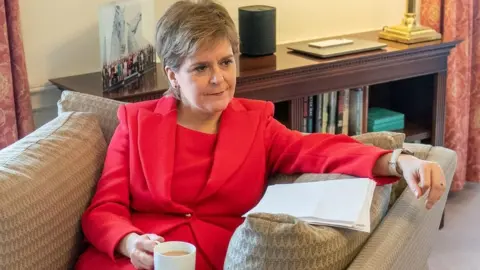SNP leadership: Unfinished business for the next first minister
 PA Media
PA Media- The next first minister will have a full in-tray on trying to get the economy moving and improving the way ministers choose their spending priorities.
- As MSPs vote through the Holyrood budget this week, external experts are ferocious in their assessment of how it's put together.
- Even on women starting up in business, Nicola Sturgeon has taken a long time to pay attention to the disadvantages they face.
In the weeks before Nicola Sturgeon hands back the Great Seal of Scotland and boxes up her books at Bute House, there is unfinished business.
A lot of it has to do with, well, business. A budget to pass on Tuesday. And the economy.
And it's likely that the low profile given to growing the economy under Ms Sturgeon's leadership might be something Kate Forbes and perhaps others will wish to change.
When she's not being required to explain her Christian faith, that seems to be one part of the turf where the finance and economy secretary intends to pitch her leadership campaign tent.
Her main rival, Humza Yousaf, has less of a track record in economic roles, either as a minister or outside politics.
As transport secretary for two years, he was on the ministerial bridge while Ferguson shipyard was heading for the rocks, and his record on ScotRail was to shift the points in the direction of public ownership.
Tinkering at the edges
Benny Higgins, the former banker who was given the task of drawing up an economic recovery plan a few months after the first Covid lockdown, does not sound impressed by progress on his report or others.
He told the Financial Times this weekend that there remains "a tendency to announce a new study or a new group, when actually there are a lot of things that are staring you in the face and you just need to tackle".
It's perceived that social justice and health has taken priority on Nicola Sturgeon's watch. And even where the outgoing First Minister has set out goals which could boost the economy, there's disappointment at the track record of following up.
There's a huge business opportunity, for instance, in insulating and re-fuelling Scotland's heating systems. The WWF environment group reports on the slow progress there.
 Getty Images
Getty ImagesThe Scottish government said it would introduce ways that tied its budget in with its commitment to reaching net zero. That hasn't gone well either, according to the Fraser of Allander Institute.
The economists were asked by the Scottish government to assess how it's doing. The response - published in a blog last week - was harsh. The easy thing is to point to hardware. But if the boring bit about budget and decision processes isn't right, or isn't even there, the targets will be missed.
The Allander people found that there's a "significant gap" between government intentions and reality - across project planning, impact on equalities or islanders, for instance, and on which project options provide the best social outcomes, let alone economic ones.
The economists concluded: "This is hugely concerning given the importance of these processes to setting clear objectives, identifying value for money, supporting evidence-based policymaking, documenting information and ensuring policy matches the overarching strategic goals of Government.
"These processes appear to be regularly missing key components, insufficient in quality, performed too late to genuinely influence how decisions are made, or missing entirely."
Continually ambitious
It's suggested the Scottish government is merely "tinkering around the edges", and as such, it's not taking its environmental targets seriously.
"Decisions being made now are locking in emissions many years in the future, and government-wide change is a slow process," conclude the Strathclyde University economists.
They quote the Committee on Climate Change, an adviser to the Scottish government, saying in December that 'Scotland's climate targets are in danger of becoming meaningless'.
And they write: "Our project has found that integration of climate targets into internal processes is severely lacking and so we echo this sentiment. Immediate action is required if the Government wishes for its climate targets to remain rooted in reality." Ouch.
The Scottish government response is to confirm that this net zero challenge is complex and on a big scale. It says it's doing work on its budget and that it remains "continually ambitious". That may all be true, but it's not to the point.
 Getty Images
Getty ImagesSo what about growing business? You might have expected Nicola Sturgeon to ensure at least that women would get a helping hand in starting up business. And yet it took until the week after she announced her departure for that issue has been addressed by a further review.
This one was launched by the First Minister with small tech firms in Midlothian, as the leadership contest was being fired up elsewhere. Its co-author, investment specialist Ana Stewart, commented on the support for women starting up in business: "I'm shocked myself by the scale of the chasm, really.
"Only one in five businesses in Scotland are female-led, and that hasn't changed in the last 10 years.
"So despite people thinking progress is being made, nothing in statistics that we've looked at - and they're very robust statistics - is telling us the progress is being made."
So there are 31 recommendations - not all for government, of course. It is in the finance sector that bigger challenges lie, while women get only 2% of the start-up funding made available by institutional investors.
Other business lobby groups are more interested in seeing where the SNP leadership candidates will go with measures that are in the pipeline to do with health and the environment and which carry a new regulatory burden, particularly for the hospitality sector - on advertising alcohol, marketing food and recycling drink containers.
As they're all agreed that independence is a good thing (they know the electorate in this contest), is that where they'll differentiate themselves from each other, and from Nicola Sturgeon?
